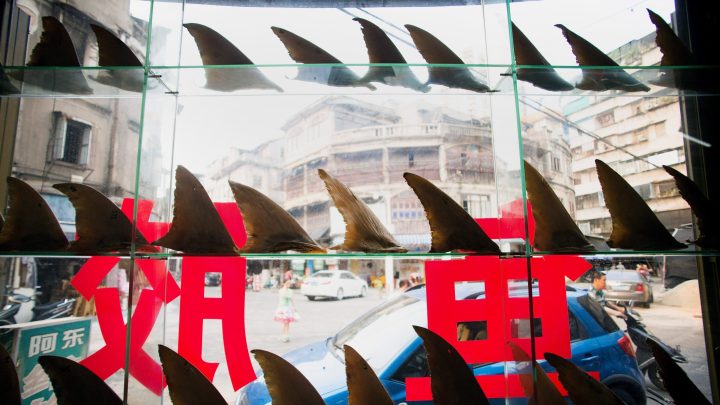
Shark populations are being threatened by a booming, illicit shark fin trade
Shark populations are being threatened by a booming, illicit shark fin trade

More than 70 million sharks are killed for their fins worldwide each year. Those fins are considered a status symbol and a delicacy in some parts of the world and are often used in a soup.
The demand for the fins have created a network of illicit trafficking, especially in Peru and Ecuador. The team behind Al Jazeera’s investigative series Fault Lines embedded themselves in a team trying to stop this trade for a new documentary, “The Shark Fin Hunters.”
Josh Rushing is a senior correspondent with the program. He recently spoke with Marketplace’s Sabri Ben-Achour about his reporting. Below is an edited transcript of their conversation.
Sabri Ben-Achour: So you and your team spent time in both Peru and Ecuador for this story. Why did you settle on those countries in particular”
John Rushing: There’s actually kind of a loophole that exists there that allows this trade to continue. Ecuador has banned shark fishing, except for sharks that are caught accidentally supposedly, but they can’t export the fins from there. Peru, which has colder waters and less sharks in their waters, has left open the legal possibility of shipping fins out, but it is controlled by the government and it’s highly structured in license. But what ends up happening is the sharks are caught in Ecuadorian waters, they’re brought in under the guise of being caught accidentally, but they’re brought in just by the tons. The fins are dried in these massive drying operations in places like Manta, Ecuador. And then they’re shipped down to Peru, where it’s easier to get them shipped out — mostly to Asia, although not always in Asia we found in our story.
Ben-Achour: You managed to find some shark fins in the U.S. How did you do that?
Rushing: So, we hired a professional wildlife investigator who does undercover work. We took him around to the different Chinatowns in New York City. He found a chef that said yes, they could do it. But long story short, we were able to go into this backroom at this restaurant and have this soup made out of these fins — which, by the way, is terrible. But in the process, we were able to sneak out some of those noodles and get them tested and verified that, yeah, they actually are sharks.
Ben-Achour: What is the major driver or destination market for shark fins?
Rushing: By far it’s Asia, China being the number one importer. [They’re] also popular in other countries like Thailand. Hundreds of years ago, you might have someone of significant status say, “Bring me, you know, these exotic meats, like a heart of a lion or a fin of a shark.” But it’s grown to be a status symbol that’s accessible for kind of the middle class. So at weddings or any big business dinner, you might be looked down upon if you don’t have shark fin to serve as an honor.
Ben-Achour: One of the fishermen you talk to makes the point that, “Listen, we don’t catch that many sharks. It’s the big boats, the hundreds of large commercial Chinese fishing vessels off the coast of South America that are responsible for the bulk of the shark catch.” Is that true? And can Peru or anybody else do anything about that?
Rushing: I believe that’s true. We stayed out with those shark fishermen and they caught to hammerhead. So they’re not really the problem at all. You’re right. It’s these massive Chinese fleets of hundreds of ships that are taking these sharks out, and they’re taking them out at the rate of 100 million a year. It’s kind of mind-boggling when you think about sharks are creatures that have been on the planet longer than trees. They’ve survived every single extinction event. And yet, in the last 50 years, their population has dropped by 70%. And that’s mostly driven by the value of their fins, which are a status symbol.
Ben-Achour: In investigating this story, did you come across any kind of solution, any steps that could be taken?
Rushing: So, I think part of it is just awareness to know what this is doing to the shark population in the ocean, to know what that could do to the entire ocean and then to our entire planet. It all depends to work together. And you have some species that are already gone and won’t come back because of this. And I think if there was greater awareness, people might have more hesitation about it. On the second side, I think people need to know this tastes like nothing. It doesn’t make you more virile. There’s no nutritional value to it. This is simply a status symbol that we can chalk up to one of those things in the past that we didn’t know better about then, but that we can move on and we can do better in the future.
There’s a lot happening in the world. Through it all, Marketplace is here for you.
You rely on Marketplace to break down the world’s events and tell you how it affects you in a fact-based, approachable way. We rely on your financial support to keep making that possible.
Your donation today powers the independent journalism that you rely on. For just $5/month, you can help sustain Marketplace so we can keep reporting on the things that matter to you.










